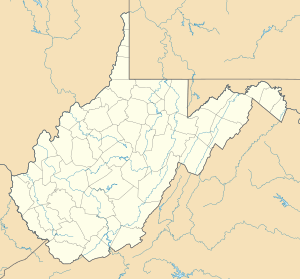Saltlick Creek (Little Kanawha River tributary) facts for kids
Quick facts for kids Saltlick Creek |
|
|---|---|
|
Location of the mouth of Saltlick Creek in Burnsville, West Virginia
|
|
| Country | United States |
| State | West Virginia |
| County | Braxton |
| Physical characteristics | |
| Main source | south of Flatwoods 1,303 ft (397 m) 38°41′44″N 80°39′15″W / 38.6956554°N 80.6542611°W |
| River mouth | Little Kanawha River Burnsville 741 ft (226 m) 38°51′24″N 80°39′22″W / 38.8567624°N 80.6562068°W |
| Length | 17.7 mi (28.5 km) |
| Basin features | |
| Basin size | 49 sq mi (130 km2) |
Saltlick Creek is a small river, also called a tributary, in central West Virginia, United States. It flows into the Little Kanawha River. The creek is about 17.7 miles (28.5 km) long.
Saltlick Creek is part of a larger watershed that eventually leads to the Mississippi River. This means all the rain and water that falls in its area flows into Saltlick Creek, then into the Little Kanawha River, then the Ohio River, and finally the Mississippi River. The area it drains is about 49 square miles (130 km2).
Where Saltlick Creek Flows
Saltlick Creek is entirely located within Braxton County. It starts about 2 miles (3.2 km) south of a town called Flatwoods.
From there, the creek flows mostly north. It passes through small communities like Corley, Rollyson, and Gem. Finally, it reaches its end at the Little Kanawha River in Burnsville. A road called West Virginia Route 5 runs alongside the creek after it passes Rollyson.
The Land Around Saltlick Creek
The land around Saltlick Creek is mostly rural. This area is part of the Allegheny Plateau, which is a high, flat area of land. Unlike some other parts of the world, this specific part of the plateau was never covered by glaciers.
Most of the land around Saltlick Creek is covered by forests. About 80% of the watershed is forested, mainly with deciduous trees. These are trees that lose their leaves in the fall, like oak or maple. The other 18% of the land is used for things like pasture for animals and agriculture (farming).
How Saltlick Creek Got Its Name
Over time, Saltlick Creek has been known by a few different names. These include "Salt Lick," "Salt Lick Creek," and "Saltlick Fork."
The creek got its name from a nearby "mineral lick". A mineral lick is a place where animals can go to lick important minerals and salt from the ground. These spots are often visited by deer and other wildlife.
 | Jackie Robinson |
 | Jack Johnson |
 | Althea Gibson |
 | Arthur Ashe |
 | Muhammad Ali |


